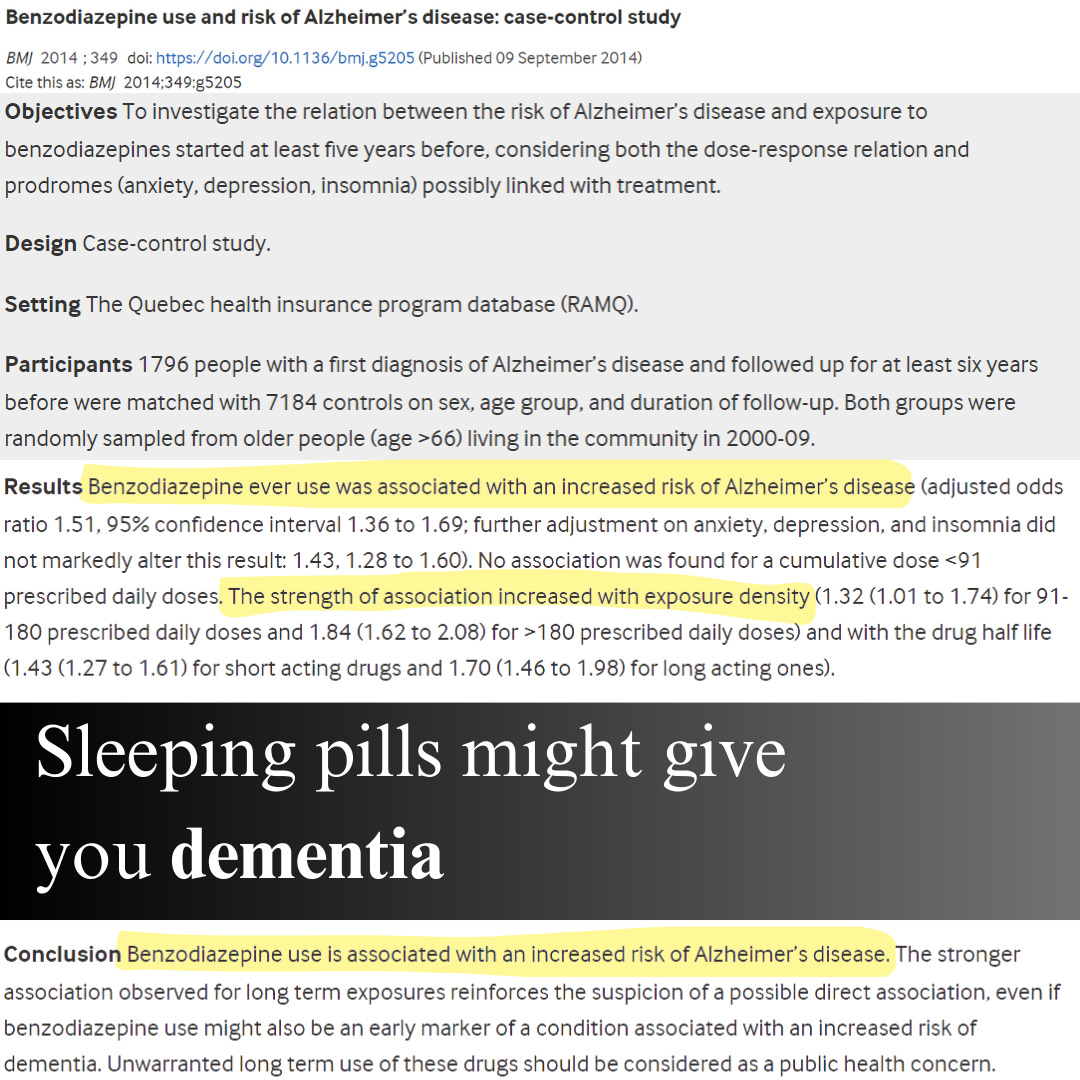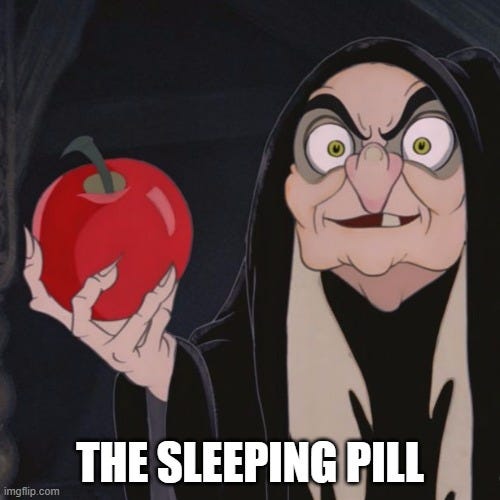Never Take Sleeping Pills
Do you have trouble going to sleep?
Sleeping pills, or sedative-hypnotic medications, are commonly prescribed to alleviate insomnia and other sleep disorders.
Side-note: how weird is it that they are called hypnotics? When I hear it, I imagine you take a pill and go into a trance and start clucking like a chicken.
While these medications appear to put you to sleep, a large body of scientific evidence shows that they damage your sleep and are harmful in the long-term.
👉👉👉Humorous sarcastic video on sleeping pills here 👈👈👈
Sleeping pills don’t work
A meta-analysis of 65 scientific studies found that sleeping pills provide a small and uncertain benefit over placebo. In other words: sleeping pills don’t do much, if anything.
Why is this?
Because sleeping pills don’t actually put you to sleep. What they do is knock you unconscious. The effect is more similar to fainting than to sleep.
Sleep is much more than being unconscious. It’s a complex symphony of neural activity where billions of events have to happen in perfect choreography.
All of that is lost when you pop a sleeping pills. Your neurons are disrupted in such a way that makes you unconscious. But you are not asleep.
Sleeping pills are harmful
Is it because they impair sleep? Or is it from their direct effect?
We don’t know. What we do know is sleeping pills are severely unhealthy.
1. Threefold risk of death
This meta-analysis of 65 scientific studies looked at the effects of sleeping pills versus placebo. It found sleeping pills provide a small and questionable benefit over placebo (aka versus sugar).
Unlike placebo, sleeping pills have a lot of harmful effects.
2. Addiction
One of the most significant dangers of sleeping pills is the potential for dependency and addiction. Benzodiazepines, in particular, are known to be habit-forming, and abrupt cessation can lead to withdrawal symptoms such as anxiety, insomnia, and even seizures. Long-term use may result in the development of tolerance, requiring higher doses to achieve the same sedative effects.
3. Cognitive impairment and dementia
Numerous studies have linked the use of sleeping pills to cognitive impairment. The active ingredients in these medications, such as benzodiazepines and non-benzodiazepines, can affect memory, attention, and overall cognitive function. Prolonged use may lead to difficulties in concentration and impaired daytime performance.
In the long-term, usage of sleeping pills is associated with higher risk of dementia, such as Alzheimer’s.
4. Increased Risk of Falls and Accidents:
Sleeping pills can cause drowsiness and impaired coordination, increasing the risk of falls and accidents, especially among the elderly. A study published in the Journal of Hospital Medicine found that the use of hypnotic medications was associated with a quadrupled risk of fall.
5. Respiratory Issues:
Certain sleeping pills, such as benzodiazepines, can depress the central nervous system, leading to respiratory suppression. This study found sleeping pills are associated with a doubling of the risk for emergency room visits for COPD or pneumonia. This poses a particular risk for individuals with pre-existing respiratory conditions, such as sleep apnea. The combination of sedative medications and compromised respiratory function may result in serious health complications.
6. Less awake
Usage of sleeping pills can lead to sleep disorders such as sleepwalking, sleep related eating disorder and sleep driving. And it can make you feel hangover and have difficulties at work, home and relationships.
7. Discomfort: constipation, diarrhea, dizziness, drowsiness, dry mouth, heartburn, headache, mental impairment, uncontrollable shaking, weird dreams, weakness, decreased sexual drive
These are some of the usual side-effects of sleeping pills. They are unpleasant, but less awful than some of the more severe long-term effects.
Conclusion:
Sleeping pills are tempting because they provide an apparent solution instantly and without effort. However they are a poisoned apple.
Don’t take the poisoned apple.
Instead of improving sleep, they damage it. Instead of benefiting your health, they harm it. Instead of increasing your lifespan, they shorten it.
You can improve your sleep and solve insomnia without sleeping pills.
The alternatives are cognitive-behavioral therapy for insomnia (CBT-I) and lifestyle changes to repair your circadian rhythm.
Here I write a lot about how to improve sleep by improving your circadian rhythm. I believe circadian health is one of the most exciting developments in current times. And I will continue to share the most useful insights about circadian rhythm.
Sleep news:
Sleep deprivation increases pain
Researchers discovered how sleep deprivation can exacerbate pain. Their study demonstrates that a neurotransmitter, N-arachidonoyl dopamine (NADA), decreases in a brain region called the thalamic reticular nucleus (TRN) due to sleep loss.
Sleep deprivation is depressing
Researchers find a connection between consistently sleeping less than five hours nightly and an increased risk of developing depressive symptoms. Initially believed that poor sleep was a mere side effect of mental illness, the study suggests sleep might precede the onset of depression.
Using genetic data from 7,146 individuals, they identified that those genetically predisposed to shorter sleep were more prone to depression. Contrarily, a genetic inclination for depression didn’t increase the odds of lesser sleep.
As Europe’s rail revolution continues apace, one of its major players has decided to bring in an improved service 24/7.
Austria’s state railway ÖBB, which has been leading the revival of overnight services in recent years, has unveiled a new 33-strong fleet of night trains, which will debut in December 2023. Amid the better all-round service, one thing stands out: a focus on solo travelers, with the new trains containing pod-like single berths, as well as standard couchettes and sleeping cars.








